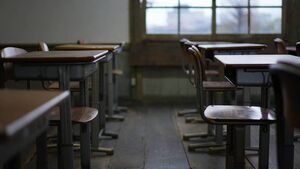Catherine Drea: Through the eyes of a child

'I will never forget the stinging red hands, the pain and ultimately for the new girl with no friends and a dying mother, humiliation and trauma.'
The way our state took for granted that children could be coerced and abused has been a huge shame for all of us. It’s common enough to try to dissociate from any responsibility, but someone was responsible, someone was the adult in the room. I keep wondering what the hell happened to the adults then? My only conclusion is that the circumstances kept them all in a childlike state; fearful, overcome, punishable sinners.
Above all though was the fact that what we now call child abuse was legal until 1982 when corporal punishment was banned in schools. Finally in 2015 it was banned outright to physically slap, physically punish or abuse a child. When I see those dates I know that my generation was part of a school system where slapping and abuse were an integral part of the Irish education system. It was normal, legal and widespread.
I went to four different schools. My mother died of cancer when I was only nine so I was moved around a fair bit between various relatives until, when it was all over, I finally settled in a nice Dominican Convent school in Dublin.
I say “a nice school” because it was for me. I’m not sure how it was for everyone and I would never assume that would be the case.
After the other schools it was a breath of fresh air, quite literally a place of safety and community that I hadn’t experienced before.
Slapping with a ruler or worse was common in the other schools. Two were rural schools and one was an inner city Dublin school where children came every day so cold and hungry that they were given milk for breakfast.
It’s one thing to have observed the abuse meted out to children who were simply failing in their school work or were distracted, but of course the abuse you remember is when it happened to yourself.
I was staying with my grandmother in a midland town, while my mother was ill and in hospital. I was so bored and jealous of the other kids going to school there, that I begged to be allowed to attend the local primary run by nuns.
My grandmother got me into second class and I went off to school full of delight and hope. I needed the contact.
It was a tough regime there. I used to wander into the “babies” classrooms where one of the nuns excelled in creative work and there were drawings and paintings on the walls. Not so in my class where there were three girls to each desk making it even harder to “do good work”.
If it was hard to write it was impossible to sew. That’s how I got myself into trouble. I had never done sewing before. This kind of sewing was making cotton samples of each kind of stitch. It required practice and skills. I had neither.
The elderly nun who took this class had a huge cane across her desk and she would whip it off the wooden legs of the desks as she walked around.
I had never seen or experienced anything quite like this. I think I had seen slapping by numbers alright. One slap for missing your spellings, two for messy work, three for cheek, but I had never seen this kind of terror on the loose. The closest I have seen since would be the commanders of Nazi concentration camps in Second World War films!
It’s hard to imagine a room full of little girls of seven or eight years old living through this. Our main aim I would say was to get through the day and avoid any slip-ups.
Unfortunately, the sewing came against me. The terror I was experiencing made every little sample I sewed a wet and clammy object.
The needle sticking from sweaty fingers, the grubby little hands of a child who never washed them from dawn to dusk.
Inevitably it didn’t end well. The old woman with all the power and a whipping cane in her possession just had to eventually use it on me.
I will never forget the stinging red hands, the pain and ultimately for the new girl with no friends and a dying mother, humiliation and trauma.
I’m not comparing the living hell of that school with some of the abuse that my contemporaries suffered and that children long after that also endured, but there isn’t an adult of my age who wouldn’t have experienced something similar.
After my mother died we moved house again and another new school. As soon as I walked in I knew that it was a safe place. The fear lifted and school became the joy I had hoped for.
Outside the school gates, the local Magdalene Laundry, not a few hundred metres away, still billowed smoke into our skies and took the heart and soul out of another generation of young women. When we walked through the grounds on a short-cut to the shops, there they were, with shorn hair and stained aprons standing outside the door having a fag maybe or enjoying a cuppa; nameless “fallen” women.
“Poor craythurs”, my father would murmur without explanation. “Be good or you will end up in the Magdalene” some of my friends were told.
Just another of the endless painful stories from what used to be called Holy Catholic Ireland.






